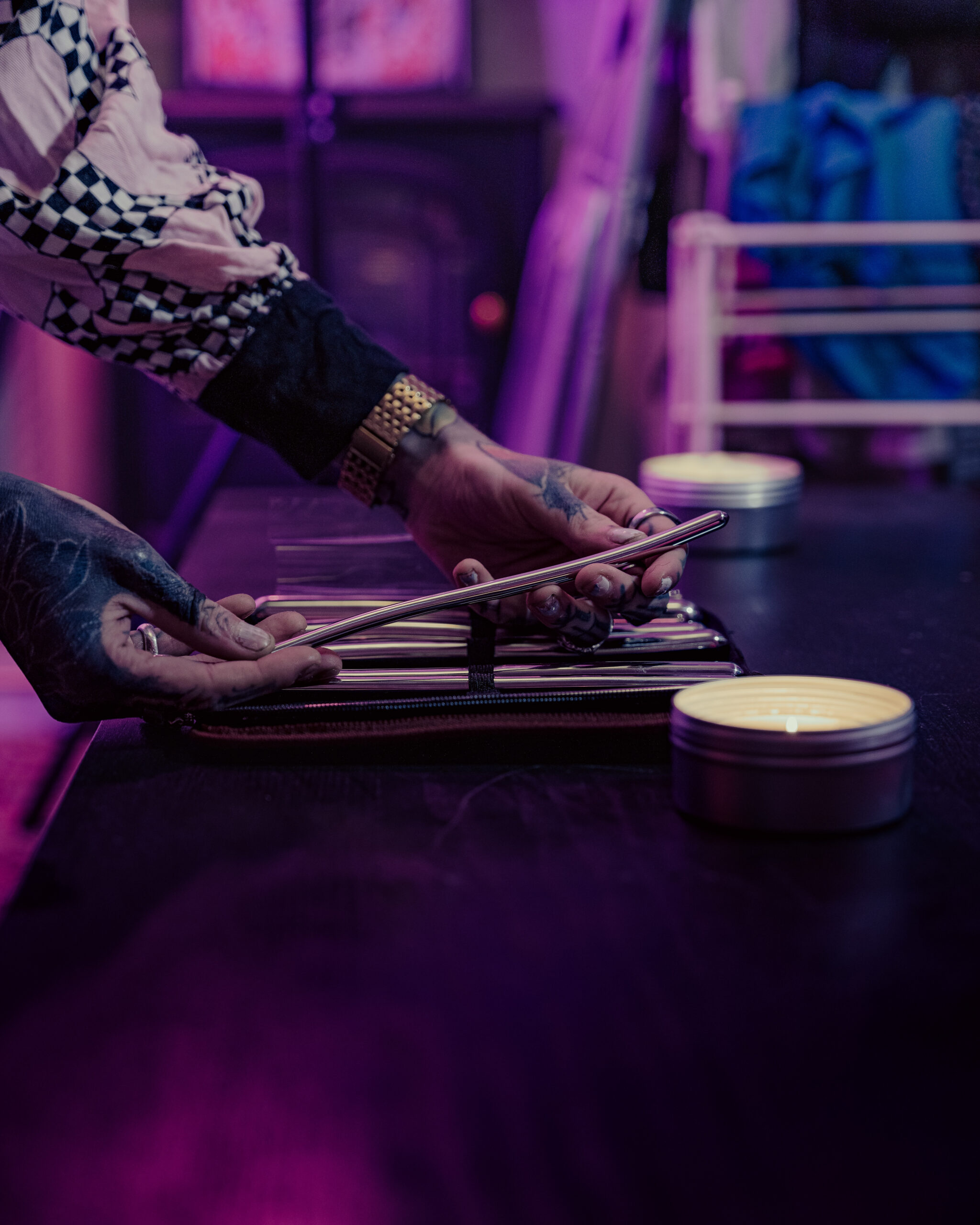The Role Of A Service Submissive: Devotion In BDSM Dynamics

Understanding the Role of a Service Submissive
A Service Submissive is an integral component of BDSM dynamics, embodying a unique blend of devotion and submission. In this context, devotion refers to a profound commitment to serving their partner, often accompanied by intense emotional investment and willingness to surrender to the partner’s desires and needs. This complex dynamic involves a deep trust and reliance on the partner, fostering an environment of mutual support and understanding. By understanding the role of a Service Submissive, one can gain insight into the intricacies of BDSM relationships and the ways in which devotion plays a crucial part in nurturing emotional intimacy and physical connection.
Bondage and Submission
A service submissive is an individual who has voluntarily taken on a role within a BDSM dynamic, surrendering control and autonomy to their dominant partner or partners. This role is characterized by devotion, loyalty, and dedication to serving the needs and desires of the dominant(s). The service submissive’s primary focus is to provide emotional, physical, and often financial support to their dominant(s), which can include tasks such as cooking, cleaning, running errands, and providing companionship.
At its core, the role of a service submissive is one of unqualified devotion. This means that the individual has given up any expectation of reward or reciprocation, aside from the pleasure and satisfaction they derive from serving their dominant(s). In return for this surrender, the dominant partner(s) provide guidance, support, and protection to the service submissive, ensuring their physical and emotional safety within the BDSM dynamic.
The role of a service submissive can encompass a range of responsibilities, from menial tasks to more complex duties such as managing finances or coordinating schedules. The key aspect of this role is the commitment to serve without expectation of personal gain, and to prioritize the needs and desires of the dominant partner(s) above one’s own.
Service submission can be a deeply rewarding experience for those who take on this role, offering a sense of purpose, belonging, and intimacy within the BDSM dynamic. However, it is essential for individuals considering service submission to carefully consider their motivations, boundaries, and expectations, as well as the needs and desires of their dominant partner(s).
It’s also worth noting that service submission is distinct from other forms of BDSM roles, such as those involving power exchange or fetish play. While these dynamics may overlap with service submission, they are not identical and require a clear understanding of one’s own boundaries and desires. fun accessories
A Key Component of BDSM Dynamics
A key component of BDSM dynamics, the role of a service submissive involves a deep level of devotion and commitment to serving their dominant partner or partners. This role is built on trust, surrender, and a willingness to prioritize the needs and desires of the dominant(s) above one’s own. In this dynamic, the service submissive is not seeking personal fulfillment or gratification, but rather finds purpose in fulfilling the desires of others.
The service submissive often engages in activities that cater to the dominant’s specific interests, such as cooking, cleaning, or providing physical care. This can include tasks like managing the household, taking care of errands, or engaging in intimate acts that are specifically requested by the dominant. The goal is not to receive praise or reward, but rather to provide a sense of security and comfort for the dominant.
As such, the service submissive must possess a high degree of emotional intelligence, empathy, and selflessness. They must be able to read the desires and needs of their dominant(s) and tailor their actions accordingly. This requires a deep understanding of the dominant’s boundaries, preferences, and motivations, as well as a willingness to adapt and evolve in response to changing circumstances.
Beyond the practical aspects, the role of a service submissive is also deeply rooted in emotional intimacy. By surrendering control and agency to their dominant(s), the service submissive enters into a state of vulnerability and openness, allowing for a profound sense of connection and trust to form. This can be an incredibly powerful and fulfilling experience, as it allows individuals to tap into deep-seated desires for love, care, and devotion.
In a healthy BDSM dynamic, the role of the service submissive is not one of subservience or oppression, but rather of mutual support and empowerment. By providing a sense of security and comfort for their dominant(s), the service submissive is able to experience a profound sense of fulfillment and purpose, while also deepening the emotional intimacy and connection with their partner(s).
The Service Submissive’s Devotion
A service submissive is an individual who has willingly entered into a power dynamic relationship within a BDSM (Bondage, Discipline, Dominance, Submission, Sadism, and Masochism) context, where they submit to a dominant partner or partner(s) in exchange for specific services, care, and attention.
In this arrangement, the service submissive devotes themselves to their dominant partners, providing emotional and physical labor, such as cooking, cleaning, running errands, or other tasks that are deemed desirable by the dominant. The level of devotion can vary widely among individuals and relationships, but it often involves a deep sense of loyalty, trust, and commitment.
The service submissive’s devotion is not solely based on coercion or obligation, but rather on a mutual agreement to establish boundaries and guidelines within which both parties feel comfortable and respected. In return for their services, the dominant partner(s) provide emotional support, validation, and often, sensual gratification.
The role of a service submissive requires a unique set of skills, including effective communication, emotional intelligence, and adaptability. They must be able to navigate complex power dynamics, maintain healthy boundaries, and prioritize their own needs while still meeting the expectations of their dominant partner(s).
Ultimately, the devotion of a service submissive is not about serving as a personal servant or servant-per-se but rather about providing care, support, and companionship within a dynamic that prioritizes mutual respect, trust, and consent. By surrendering to the will of their dominant partners, service submissives are able to access new levels of emotional vulnerability, intimacy, and connection.
Dynamics of Power and Control
Dynamics of power and control are a fundamental aspect of BDSM dynamics, where individuals engage in complex interactions that involve negotiation, agreement, and compromise. In these relationships, power struggles are not only present but also negotiated and managed through explicit communication and consent. A service submissive, who devotes themselves to serving their dominant partner or partners, plays a unique role within this dynamic.
Establishing a Power Dynamic
Dynamics of power and control are intricately woven into the fabric of any BDSM relationship, and the role of a service submissive plays a pivotal part in this dynamic. A service submissive is an individual who willingly surrenders their autonomy, agency, and control to a dominant partner or partners, often in exchange for specific pleasures, sensations, or benefits.
This surrender is not simply a matter of acquiescence, but rather a deliberate choice made with the full understanding of its implications. The service submissive has entered into an agreement with their dominant(s), outlining the terms of their submission, including boundaries, safewords, and the specific services they will provide in exchange for attention, care, or other forms of appreciation.

Establishing a power dynamic in BDSM is not merely about exerting dominance over another, but also involves creating a mutually beneficial arrangement that acknowledges and respects the needs, desires, and limitations of all parties involved. This mutual respect and understanding are essential in fostering a healthy, consensual, and enjoyable dynamic between service submissives and their dominant partners.
The dynamics of power and control also involve a deeper psychological aspect, where the service submissive experiences a shift in self-perception, identity, and sense of self-worth. This transformation can be profound, as the individual surrenders their ego, pride, and attachment to control, allowing them to tap into a deeper sense of submission, trust, and devotion.
Ultimately, the role of a service submissive in BDSM dynamics is one of mutual growth, learning, and exploration. By embracing their submission, individuals can discover new aspects of themselves, develop greater intimacy with their partners, and cultivate a deeper understanding of the complex dance between power, control, and consent that underlies all human relationships.
The Role of the Dominant in Submission
The concept of dominance and submission in BDSM dynamics is deeply rooted in the power dynamics at play. In this context, the dominant individual assumes control over the submissive’s body, emotions, and actions, exercising authority through various means such as verbal commands, physical touch, or sensual deprivation.
Research has shown that submission can be a mutually beneficial experience for both parties involved in BDSM relationships. For the submissive, surrendering to the dominant’s desires can provide a sense of safety, security, and emotional release. The submissive may feel a deep sense of trust and loyalty towards the dominant, which can foster a strong bond between them.
The role of the dominant is multifaceted, encompassing both psychological and physical control. Dominants often employ techniques such as negotiation, education, and guidance to establish clear boundaries and ensure the submissive’s comfort level. This may involve activities like scene-setting, sensory play, or bondage, all designed to maximize pleasure and minimize pain.
One crucial aspect of BDSM dynamics is the establishment of trust between partners. Trust allows for open communication, consent, and vulnerability, all essential elements in creating a healthy and mutually respectful relationship. Dominants must carefully consider their actions, ensuring they prioritize the submissive’s well-being and desires, while also maintaining their own boundaries and needs.
Furthermore, the role of the dominant extends beyond mere control, as they often take on a mentorship or coaching aspect, helping the submissive to explore their limits, desires, and boundaries. This can involve guidance on safe practices, risk assessment, and negotiation strategies, ultimately empowering the submissive to become more confident and self-assured in their own relationships.
The Importance of Clear Boundaries
Dynamics of power and control are intricately woven into the fabric of any relationship, particularly within BDSM dynamics where roles such as service submissive hold significant sway. A key aspect of this dynamic is the establishment of clear boundaries.

Clear boundaries are essential in any relationship, but they assume a paramount role when navigating complex power exchanges like those found in BDSM. These boundaries serve as the foundation upon which all other aspects of the dynamic are built, providing a framework for both parties to understand their roles, responsibilities, and limits.
Without clearly defined boundaries, power imbalances can arise, leading to an uneven distribution of control and potentially resulting in emotional or physical harm. Conversely, when boundaries are established and respected, they foster trust, respect, and open communication between partners, allowing them to navigate the dynamic with greater ease and confidence.
In the context of a service submissive relationship, clear boundaries are critical for ensuring that the submissive’s needs and desires are not only acknowledged but also prioritized. This includes understanding their limits, establishing safe words, and respecting their consent in all aspects of the dynamic.
The Service Submissive’s Responsibilities
The role of a service submissive in a BDSM dynamic is one of profound devotion and surrender. A service submissive has entered into an agreement with their dominant partner, committing to fulfill specific roles and responsibilities that are tailored to the needs and desires of the relationship. This can include tasks such as errands, household chores, or emotional labor, all designed to support and please their partner. In return for these services, the service submissive receives validation, attention, and affection from their dominant, as well as a sense of safety and security within the relationship.
Serving and Catering to the Dominant

A service submissive’s responsibilities are multifaceted and crucial to maintaining healthy and fulfilling BDSM dynamics. Their role is not only to provide physical care and comfort, but also to cater to the emotional and psychological needs of their dominant partner.
A key aspect of a service submissive’s duties is to be attentive to their dominant’s every need, whether it be a desire for food, drink, or attention. They must be able to read their dominant’s body language and vocal cues, anticipating and fulfilling their desires before they are even expressed.
- Providing personal care such as bathing, dressing, and grooming, while also being mindful of the dominant’s preferences and boundaries. sexy party ideas
- Serving meals and snacks, often in a specific order or at predetermined times, and catering to any dietary restrictions or allergies.
- Fulfilling other domestic duties such as light housekeeping, laundry, and errands, all while maintaining a focus on their dominant’s needs.
Furthermore, a service submissive must be willing to engage in emotional labor, providing comfort, reassurance, and support to their dominant during times of stress or anxiety. This may involve active listening, empathy, and validation, as well as being able to offer words of affirmation and encouragement.
In return for these services, the service submissive can expect a range of rewards and benefits, including affection, appreciation, and reciprocation from their dominant partner. By prioritizing their dominant’s needs and desires, the service submissive is able to build trust, intimacy, and a deep sense of connection within the BDSM relationship.
Providing Emotional Support and Companionship
In a BDSM dynamic, a service submissive plays a vital role in providing emotional support and companionship to their dominant partner. This relationship is built on mutual trust, respect, and devotion, where the submissive dedicates themselves to serving and caring for their partner’s needs.
One of the primary responsibilities of a service submissive is to offer emotional support and comfort to their partner. This can involve listening actively, providing words of encouragement, and being present during times of stress or anxiety. A service submissive may also help their partner relax, either through physical touch, relaxation techniques, or simply by creating a calm atmosphere.
In addition to emotional support, a service submissive is responsible for attending to their partner’s physical needs. This can include tasks such as cooking, cleaning, and running errands. Service submissives may also take on responsibilities related to their partner’s health, well-being, and personal care.
A key aspect of a service submissive role is the cultivation of intimacy and connection with their partner. This involves building trust, establishing clear boundaries, and fostering open communication. A service submissive must be willing to engage in vulnerable activities, such as emotional vulnerability, sensual play, or intimate conversations, in order to strengthen their bond with their partner.
The role of a service submissive is not limited to the dominant partner; they also provide emotional support and companionship to other members of the household, if applicable. A service submissive’s devotion can create a sense of stability and security within the family or household unit.

Maintaining a Clean and Organized Space
The Service Submissive’s Responsibilities encompass more than just their role as a recipient of dominance and submission within a BDSM dynamic. A crucial aspect of this role is maintaining a clean and organized space, both physically and emotionally. This responsibility is essential for several reasons.
A well-maintained living or working space not only reflects the Service Submissive’s respect for themselves and their partner(s), but also demonstrates their commitment to their own well-being and safety. A cluttered or disorganized environment can lead to feelings of anxiety, stress, and overwhelm, which can negatively impact the Service Submissive’s ability to fully surrender and devote themselves to their role.
Additionally, maintaining a clean and organized space is a practical aspect of being a Service Submissive. It allows them to focus on their tasks and responsibilities without unnecessary distractions or burdens, ensuring that they can devote themselves fully to their partner(s) and the dynamic at hand. By keeping their personal space tidy and organized, the Service Submissive is better equipped to receive guidance, care, and attention from their partner(s), creating a more positive and empowering experience for all parties involved.
Furthermore, the responsibility of maintaining a clean and organized space can also serve as a symbol of the Service Submissive’s devotion to their role. By taking care of the physical aspects of their environment, they demonstrate their commitment to providing a safe, comfortable, and respectful space for themselves and their partner(s) to explore their desires and boundaries.
The Value of Obedience and Trust
The role of a service submissive in a BDSM dynamic is one built upon a foundation of obedience, trust, and devotion. This relationship is not about domination or control, but rather about mutual surrender and the exchange of power. A service submissive offers their submission as a way to serve another, often with a focus on meeting specific needs or desires. In return, they receive care, support, and intimacy from their dominant partner. Trust is paramount in this dynamic, as both parties rely heavily on each other for emotional and psychological nourishment.
Obedience as a Virtue in BDSM Relationships
Obedience can be a challenging concept for individuals to grasp, especially when it comes to power dynamics and relationships built on trust. In the context of BDSM, obedience is not just about following commands; it’s about surrendering one’s autonomy, desires, and needs to another person or entity. When a service submissive enters into an arrangement with their primary, they are committing to a deep level of devotion, which can be both exhilarating and intimidating.
This devotion is not about blind compliance but rather about trust – the faith that one partner has in the other’s ability to provide care, protection, and pleasure. When trust exists, obedience becomes less about obeying rules and more about surrendering to the needs of another. This can lead to a profound sense of liberation for both parties involved, as the submissive is free from the burdens of decision-making and responsibility.
As a virtue in BDSM relationships, obedience highlights the importance of mutual respect, communication, and boundaries. A well-functioning service dynamic requires that all parties be on the same page regarding expectations, limits, and desires. The service submissive must have faith in their primary’s ability to navigate these complexities while prioritizing their own needs and well-being.
Furthermore, obedience in a BDSM context emphasizes the significance of emotional connection and vulnerability. The act of surrendering one’s autonomy requires a level of trust that goes beyond mere rational understanding; it demands an intuitive sense of connection and empathy between partners. When these elements are present, the bond between a service submissive and their primary can become incredibly strong, providing a foundation for deep intimacy and fulfillment.
Ultimately, the value of obedience in BDSM relationships lies not in its own right but as a means to facilitate deeper connections and greater understanding. By embracing this aspect of BDSM dynamics, individuals can cultivate more meaningful, healthy, and fulfilling relationships built on trust, respect, and open communication.
Trust: The Foundation of a Healthy Submission
Obedience and trust are the cornerstones of any successful BDSM dynamic, particularly when it comes to the role of a service submissive. A service submissive’s devotion to their Master or Mistress is unwavering, stemming from a deep-seated trust that has been established through mutual respect, communication, and a willingness to surrender. This trust is not something that can be forced or coerced; rather, it grows organically over time as both parties work together to build a foundation of reliability and dependability.
When a service submissive trusts their Master or Mistress, they are able to surrender fully, letting go of the need for control and agency. This surrender is not about passivity or weakness, but rather about being present in the moment and allowing oneself to be guided by someone who has earned that trust. It requires a level of faith that can be challenging to maintain, but one that ultimately leads to profound intimacy and connection.
The value of obedience in a service submissive role lies not just in the act of surrendering to authority, but also in the understanding that this submission is not about dominance or control, but rather about serving. A service submissive recognizes that their role is one of support and care, using their skills and abilities to serve their Master or Mistress in a meaningful way.
Trust, in turn, is the foundation upon which all successful BDSM dynamics are built. It requires a level of vulnerability and openness that can be intimidating for some, but it is essential for building strong relationships based on mutual respect and understanding. When a service submissive trusts their Master or Mistress, they are able to access new levels of intimacy, creativity, and connection that would otherwise remain hidden.
Cross-Checking Boundaries to Ensure Safety
Obedience and trust are the cornerstones of any successful BDSM dynamic, particularly in the role of a service submissive. This dynamic involves a deep surrender of control to a dominant partner, with the submissive relinquishing autonomy and decision-making authority in favor of their partner’s guidance. The value of obedience in this context lies not only in its ability to provide a sense of security and stability, but also in its capacity to foster an environment of mutual respect and trust.
The act of obedience is built upon a foundation of trust, where the submissive relies on their partner to make decisions that prioritize their safety and well-being. This requires an unwavering faith in one’s partner, who must be able to provide reassurance and guidance without hesitation or expectation of reciprocation. As a result, the service submissive develops a profound understanding of their own needs and desires, as well as those of their partner, allowing for a harmonious balance between control and submission.
Cross-checking boundaries is essential in this context, ensuring that the dominant partner is aware of and respects the limits set by the submissive. This involves ongoing communication and negotiation to ensure that both partners are on the same page, with clear understanding of what is and isn’t acceptable within the dynamic. By establishing and maintaining healthy boundaries, both parties can feel secure in their partnership, allowing for a deeper level of intimacy and trust to develop.
In a service submissive role, obedience and trust serve as the pillars that hold the relationship together, providing a sense of stability and security in an otherwise vulnerable position. Through mutual respect, trust, and clear communication, both partners can work together to create a harmonious and fulfilling dynamic, one that prioritizes the well-being and safety of all involved.
The Significance of Emotional Labor
The role of a service submissive in BDSM dynamics is often misunderstood, with many assuming it is simply about providing a predetermined set of services to a dominant partner. However, this overlooks the complex emotional labor that occurs when a submissive devotes themselves to their partner’s needs and desires.
Emotional labor refers to the effort and mental energy individuals expend on managing their own emotions, as well as those of others, in order to create a desired impression or achieve a specific social outcome. In the context of BDSM, this can involve suppressing one’s own feelings, needs, and desires in order to prioritize the pleasure and satisfaction of a dominant partner.
The significance of emotional labor in this dynamic cannot be overstated. It is what allows submissives to form deep connections with their partners, often blurring the lines between personal and role-based identity. By surrendering control and emotional regulation to their dominant, submissives are able to experience a unique sense of vulnerability and trust.
Furthermore, emotional labor in this context also raises questions about power dynamics, consent, and boundaries. When one partner is expected to manage the other’s emotions, it can create an uneven distribution of power, potentially leading to feelings of resentment or exploitation.
The Emotional Toll of Being a Service Submissive
The concept of emotional labor is multifaceted and has become increasingly relevant in today’s society, particularly within the context of BDSM dynamics.
At its core, emotional labor refers to the process of managing one’s emotions to meet the needs of others, often at a significant personal cost. In the realm of BDSM, service submission plays a vital role in this equation. A service submissive is an individual who has voluntarily taken on a role that involves providing emotional and psychological support to their dominant partner, often through acts of devotion.
The significance of emotional labor lies in its ability to create a sense of surrender and vulnerability for the service submissive. By allowing themselves to be deeply invested in their partner’s needs, they are able to tap into a profound sense of intimacy and connection. However, this comes at a cost – one that is often overlooked or undervalued by those outside of the BDSM community.
The emotional toll of being a service submissive can be severe, with many individuals reporting feelings of burnout, anxiety, and depression as a result of their role. The constant need to manage their emotions and prioritize their partner’s needs can lead to a sense of emotional exhaustion, making it challenging for the individual to maintain healthy boundaries or pursue their own interests.
Furthermore, the emphasis on devotion and surrender in BDSM dynamics can perpetuate unhealthy power imbalances and reinforce societal norms that devalue emotional labor. The notion that one’s emotions should be managed solely for the benefit of others is a far cry from acknowledging the inherent worth and dignity of individual feelings and needs.
Ultimately, recognizing the significance of emotional labor within BDSM dynamics is crucial for promoting healthier relationships and fostering greater understanding between partners. By acknowledging the emotional toll of service submission and working to create more equitable power balances, we can begin to dismantle societal norms that devalue emotional expression and prioritize instead the cultivation of empathy, communication, and mutual respect.
Coping Mechanisms for Managing Stress and Burnout
Emotional labor refers to the effort and energy expended by individuals, often in service roles, to manage their emotions and provide a certain emotional experience for others. In the context of BDSM dynamics, this can be particularly significant as it involves not only managing one’s own emotions but also those of one’s partner or client.
Service submissives, who embody the role of devotion in BDSM relationships, often engage in intense emotional labor to create a safe and pleasurable experience for their partners. This may involve suppressing their own desires and boundaries in order to meet the needs of others. The emotional toll of this kind of labor can be substantial, leading to stress, burnout, and even emotional exhaustion. club looks
So, how do service submissives cope with the demands of emotional labor? Here are some common strategies:
-
Creativity and self-expression
-
Boundaries and negotiation
-
Support systems and community
-
Self-care and prioritization
By recognizing the importance of emotional labor in BDSM dynamics, service submissives can begin to develop healthier coping mechanisms that prioritize their own well-being. This may involve establishing clear boundaries, engaging in self-care activities, and building a support network of peers who understand the unique challenges of this role.
Avoiding burnout requires ongoing attention to one’s emotional state, as well as proactive strategies for managing stress and maintaining emotional resilience. By acknowledging the significance of emotional labor and cultivating healthy coping mechanisms, service submissives can create a more balanced and fulfilling experience for themselves and their partners alike.
The Importance of Self-Care in BDSM Relationships
The role of a service submissive in BDSM dynamics often involves a complex interplay of emotional labor and self-care. A service submissive is expected to provide a specific type of care or attention to their dominant partner, which can be emotionally draining if not managed properly.
Emotional labor refers to the process of managing one’s own emotions to meet the demands of others. In BDSM relationships, this can take the form of suppressing one’s own needs and desires in order to prioritize those of their partner. A service submissive must navigate this emotional labor with care, as failing to manage their emotions properly can lead to burnout and resentment.
Self-care is essential for a service submissive, as it allows them to maintain their emotional well-being and prevent emotional exhaustion. This can take many forms, including activities that promote relaxation and stress relief, such as massage or meditation. A service submissive may also prioritize self-care by setting boundaries with their dominant partner, communicating their own needs and desires, and establishing healthy expectations for the relationship.
Furthermore, a service submissive’s role requires a deep understanding of emotional labor and its impact on their own mental health. By prioritizing self-care and recognizing the importance of emotional labor, a service submissive can maintain a healthy balance between giving and taking in the relationship, ensuring that their own needs are met while also fulfilling their duties to their partner.
Ultimately, the significance of emotional labor and self-care in BDSM relationships lies in their ability to promote healthy dynamics and prevent burnout. By prioritizing their own emotional well-being, a service submissive can build a strong foundation for a fulfilling and respectful relationship with their dominant partner. vintage vibe
Discover Dolce Piccante for sensual and playful experiences at Peaches and Screams Stay safe with condoms from Peaches and Screams Shop plus-size women’s clubwear, mini dresses, and dresses in size 18 at Peaches and Screams Buy luxury vibrators for an elevated experience at Peaches and Screams Explore Lux Fetish products for luxurious BDSM experiences at Peaches and Screams Shop stretchy cock rings for comfort and stretch at Peaches and Screams Buy bridal and wedding lingerie for your special day at Peaches and Screams
Elizabeth Rohrbaugh Goonie Yoga and Therapy Lottie London Aesthetics Mocha Kid Magazine Detailed Weddings LA





















